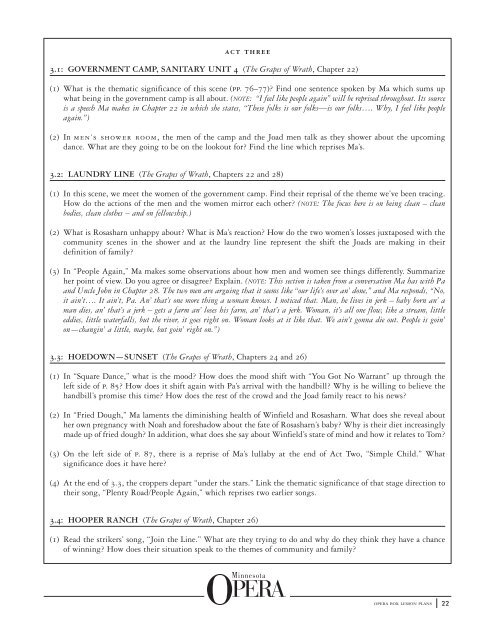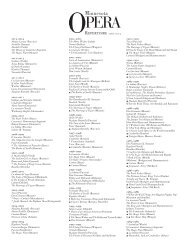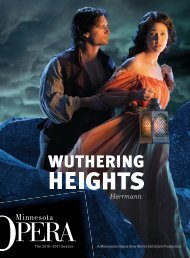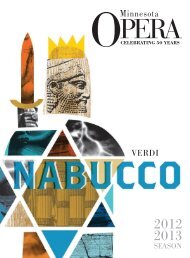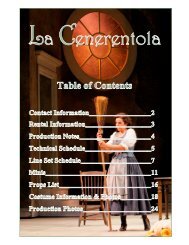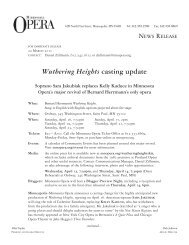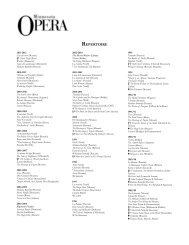Create successful ePaper yourself
Turn your PDF publications into a flip-book with our unique Google optimized e-Paper software.
act three<br />
3.1: GOVERNMENT CAMP, SANITARY UNIT 4 (The <strong>Grapes</strong> of Wrath, Chapter 22)<br />
(1) What is the thematic significance of this scene (pp. 76–77)? Find one sentence spoken by Ma which sums up<br />
what being in the government camp is all about. (NOTE: “I feel like people again” will be reprised throughout. Its source<br />
is a speech Ma makes in Chapter 22 in which she states, “These folks is our folks—is our folks…. Why, I feel like people<br />
again.”)<br />
(2) In men’s shower room, the men of the camp and the Joad men talk as they shower about the upcoming<br />
dance. What are they going to be on the lookout for? Find the line which reprises Ma’s.<br />
3.2: LAUNDRY LINE (The <strong>Grapes</strong> of Wrath, Chapters 22 and 28)<br />
(1) In this scene, we meet the women of the government camp. Find their reprisal of the theme we’ve been tracing.<br />
How do the actions of the men and the women mirror each other? (NOTE: The focus here is on being clean – clean<br />
bodies, clean clothes – and on fellowship.)<br />
(2) What is Rosasharn unhappy about? What is Ma’s reaction? How do the two women’s losses juxtaposed with the<br />
community scenes in the shower and at the laundry line represent the shift the Joads are making in their<br />
definition of family?<br />
(3) In “People Again,” Ma makes some observations about how men and women see things differently. Summarize<br />
her point of view. Do you agree or disagree? Explain. (NOTE: This section is taken from a conversation Ma has with Pa<br />
and Uncle John in Chapter 28. The two men are arguing that it seems like “our life’s over an’ done,” and Ma responds, “No,<br />
it ain’t…. It ain’t, Pa. An’ that’s one more thing a woman knows. I noticed that. Man, he lives in jerk – baby born an’ a<br />
man dies, an’ that’s a jerk – gets a farm an’ loses his farm, an’ that’s a jerk. Woman, it’s all one flow, like a stream, little<br />
eddies, little waterfalls, but the river, it goes right on. Woman looks at it like that. We ain’t gonna die out. People is goin’<br />
on—changin’ a little, maybe, but goin’ right on.”)<br />
3.3: HOEDOWN—SUNSET (The <strong>Grapes</strong> of Wrath, Chapters 24 and 26)<br />
(1) In “Square Dance,” what is the mood? How does the mood shift with “You Got No Warrant” up through the<br />
left side of p. 85? How does it shift again with Pa’s arrival with the handbill? Why is he willing to believe the<br />
handbill’s promise this time? How does the rest of the crowd and the Joad family react to his news?<br />
(2) In “Fried Dough,” Ma laments the diminishing health of Winfield and Rosasharn. What does she reveal about<br />
her own pregnancy with Noah and foreshadow about the fate of Rosasharn’s baby? Why is their diet increasingly<br />
made up of fried dough? In addition, what does she say about Winfield’s state of mind and how it relates to Tom?<br />
(3) On the left side of p. 87, there is a reprise of Ma’s lullaby at the end of Act Two, “Simple Child.” What<br />
significance does it have here?<br />
(4) At the end of 3.3, the croppers depart “under the stars.” Link the thematic significance of that stage direction to<br />
their song, “Plenty Road/People Again,” which reprises two earlier songs.<br />
3.4: HOOPER RANCH (The <strong>Grapes</strong> of Wrath, Chapter 26)<br />
(1) Read the strikers’ song, “Join the Line.” What are they trying to do and why do they think they have a chance<br />
of winning? How does their situation speak to the themes of community and family?<br />
opera box lesson plans<br />
22


